You have probably seen the beautiful berries that give the charming beautyberry its name, yet this deciduous shrub is often overlooked. Its vibrant purple berries make this shrub most recognizable. And yes, it can be a great addition to your landscape! In this series, we will uncover the origins, growing conditions, and importance of native species, like the Florida beautyberry, to support our environment and conserve resources.
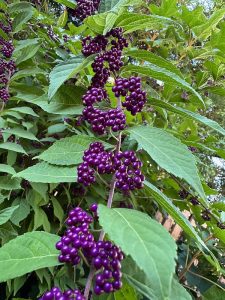
The Value of Native Species
Native plants are often overlooked gems in the world of gardening. Native flora, like the beautyberry, have adapted to Florida’s specific climate and soil conditions, making them resilient and low-maintenance additions to most landscapes. Planting native flora is important for environmental health and contributes to the establishment of thriving, sustainable landscapes in Florida.
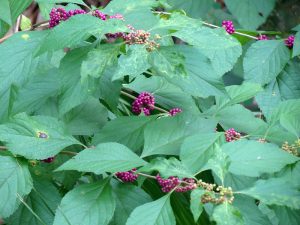
Origins of the Beautyberry
The beautyberry gets its name from its striking fuchsia berries which are seen in late summer through fall. The beautyberry (Callicarpa americana) is indigenous to the southeastern United States, including the lush landscapes of Florida. This hardy shrub thrives in Florida’s sunshine and periodic rainfall, embodying resilience and natural beauty.
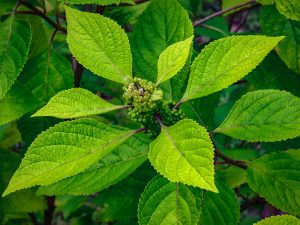
Growing Conditions and Characteristics
Beautyberry flourishes in partial to full shade, which makes them suitable for a variety of landscapes. They can grow in most soil conditions and are tolerant of occasional drought. These shrubs can withstand a broad spectrum of temperatures and will grow in USDA Hardiness Zones 7-11. Their growth habit ranges from upright to sprawling, offering versatility in landscape design.
Beautyberries are perennials that serve as excellent choices for woodland gardens, border plantings, or as focal points in native landscapes. Their striking purple berries attract birds and other wildlife, adding a splash of color to any Florida garden.
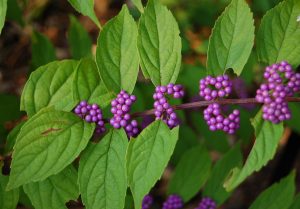
Why Plant Native Species?
Native species have adapted to the environment, which means they are low maintenance additions that support the local ecosystems. Another advantage of native plants is that they have evolved with indigenous wildlife. This means you can have the aesthetics of a beautiful healthy landscape and nurture local ecosystems at the same time.
Overall, they require minimal upkeep, demanding less water, fertilizer, and pesticides compared to non-native alternatives. By selecting natives, we can conserve water, lessen maintenance efforts, and safeguard resources. That being said, not all exotic plants are invasive or aggressive in nature. There is room for diversity in the home landscape and exotic plants can be a part of that diversity.
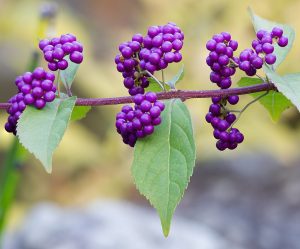
The Detriment of Invasive Species
While native plants like the beautyberry contribute positively to our environment, invasive species pose significant threats to ecosystems. These aggressive plants outcompete native species, upsetting ecological balance and diminishing biodiversity. In Florida, invasive species such as melaleuca and air potato vine threaten native habitats by crowding out native flora and fauna.
Remember the cardinal rule of Florida-Friendly Landscaping: Plant the right plant in the right place. Location is key when considering both exotic and native plants. When planning your garden or landscape design, consider the beautyberry. Not only will you be treated to its delightful berries year after year (that you can eat), but you will also be playing a vital role in supporting local biodiversity and conserving resources.
Conclusion
With their ability to attract wildlife and thrive in diverse garden settings, beautyberries stand out as a striking and sustainable choice for your garden. Native species offer an ideal option for gardeners seeking vibrant, low-maintenance, and ecologically rich landscapes.
Have a question?
If you have any questions about gardening in Central Florida, please contact UF/IFAS Extension Pasco County at 352-518-0156. For more information on UF/IFAS Extension Pasco County Community Gardens, and how you can join one, visit http://sfyl.ifas.ufl.edu/pasco/. Supervising agent: Dr. Whitney Elmore.
Follow us!
We have several ways to connect. Visit our Facebook, Instagram, Eventbrite, Blogs, Florida-Friendly Facebook, & Website.
More resources:
- UF/IFAS Extension Pasco County
- Dr. Whitney Elmore’s Podcast: Rooted in Florida
- Extension Connection: Florida Friendly Landscaping
 4
4
